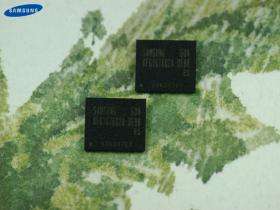Samsung Mass Producing 1Gb Flash Memory, using 70-nm Process

Samsung Electronics announced today that it is now mass producing 70nm 1Gb OneNAND, a widely used memory device that provides higher performance over conventional flash devices.
The higher-speed memory is targeted toward a wide range of applications beyond mobile handsets including memory cards for digital cameras and use in hybrid hard disk drives. By moving to 70nm designs, Samsung has achieved a 70% greater efficiency than the 90nm processing currently used throughout the industry.
Samsung's 70nm OneNAND fuses together the rapid boot-up and data-read functions of NOR flash memory, plus the high-capacity data storage and fast writing capabilities of NAND flash memory. The 70nm device is now designed into well over 100 mobile products, with new demand coming from market segments for digital cameras, set-top boxes and digital TVs. Last month, at the 3rd annual Samsung Mobile Solution Forum, Samsung also unveiled a high-speed memory card equipped with OneNAND.
The OneNAND device has a sustained read speed of 108MB/s, which is 60% faster than previous 90nm OneNAND device. The 70 nm OneNAND supports a synchronous clock frequency of 83MHz, and offers enhanced compatibility with the clock frequencies of a wide range of mobile products.
OneNAND will be used in a growing number of applications, including handsets, hybrid hard disks, memory cards and other consumer electronics products. Given its projected new markets and expanded applications in the existing mobile market, Samsung predicts OneNAND sales to reach US$1 billion in 2008 and soar above$1.5 billion by 2010.
Source: Samsung















